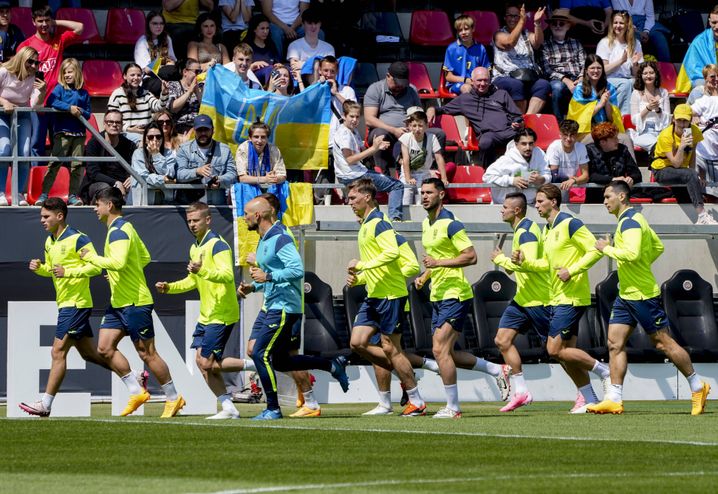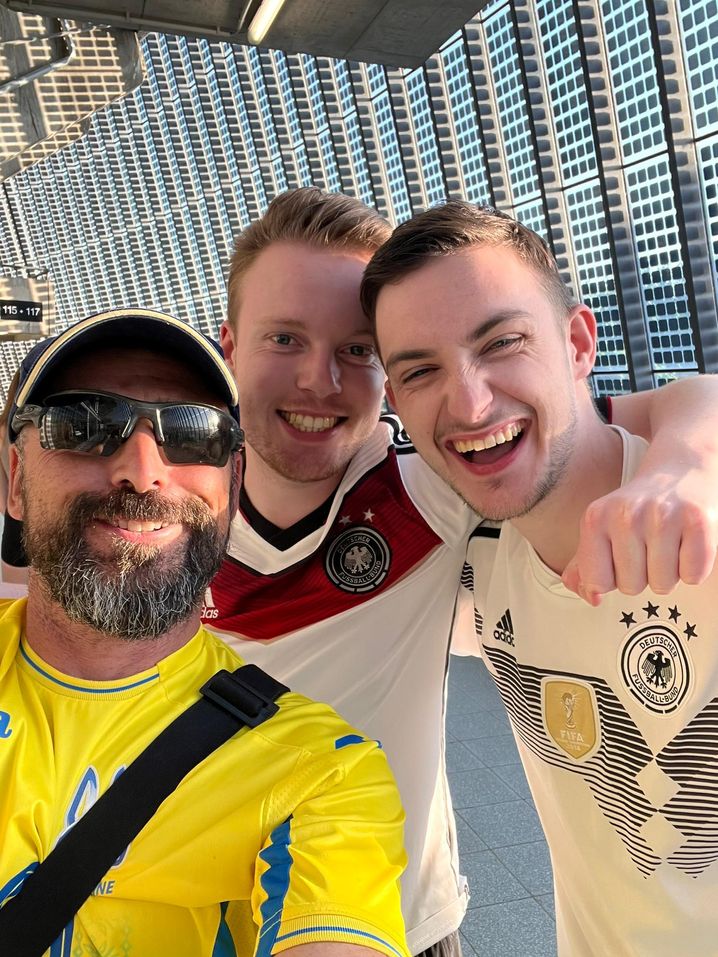Blue and yellow everywhere, on flags and jerseys. In their training camp in Wiesbaden, in the southwest of Germany, Ukrainian footballers play at home, even far from their war-ravaged country. Not new for Shakhtar Donetsk players, who played their European Cup matches “at home” in Hamburg last season.
A large section of the public should still push behind Moudrik, Zinchenko and their teammates this Monday for their first Euro match, in Munich against Romania. Danylo Cherkashenko will be there, as for the two other group matches, Friday in Düsseldorf against Slovakia then on June 26 in Stuttgart against Belgium.
This 47-year-old videographer, who has been living in Germany for a quarter of a century, co-founded the UASUPPORT.DE project in 2006. As its name suggests, it is about supporting Ukrainian athletes in all competitions in which they participate, in Western Europe. “For this Euro, many members of our association, who know the language and the cities which host the competition, will help the organizers on match days,” explains the forty-year-old who will be accompanied by around 200 people at each meeting.
Partnerships launched well before the Russian invasion
An example at the local level of the links established between the football of the two countries, significantly strengthened since the Russian invasion of February 2022. Germany is, by far, the first country to host Ukrainian refugees, with more than a million displaced people.
On the sidelines of the friendly match between the two selections on June 3 in Nuremberg, former Ballon d’Or Andriy Shevchenko, now president of the Ukrainian Federation, signed a cooperation agreement with his counterpart from the German Federation (DFB) Bernd Neuendorf. This document provides for the development of football camps across the Rhine for young Ukrainians and their coaches.

Nothing other than the extension of exchanges that have already existed for several years under the aegis of the DFB-Stiftung Egidius Braun Foundation, born in 2001 and named after a former president of the Federation (1992-2001). Braun, who died in 2022 at the age of 97, was also vice-president of UEFA at the time of the collapse of the USSR in the early 1990s, which led him to support the country’s federations born in the wake, including that of Ukraine.
Refugees welcomed in 587 German clubs
“Immediately after the outbreak of the Russian war of aggression against Ukraine, the foundation launched a program for football clubs which supported Ukrainian refugees,” said a spokesperson for the organization. In total, 587 football clubs each received a bonus of 500 euros, to finance licenses and equipment, for example. With the help of the Federal Government Commissioner for Migration, 293,500 euros were paid. »
Since February 2022, the foundation, supported by various partners, has financed 10 million euros of various aid to Ukraine, often aimed at young people, but not only. “For example, we provided food and helped repair infrastructure, or even supported the Klitschko Foundation. » This charitable organization was created by former boxer Wladimir Klitschko, brother of Vitali, another world heavyweight champion who became mayor of kyiv.

“But teams and athletes from other sports also receive support,” continues Danylo Cherkashenko, citing fellow divers welcomed in Aachen to prepare for the 2022 European Championship, or the Motor handball team Zaporizhia, Ukrainian champion hosted in Bundesliga 2 during the 2022-2023 season.
Cherkashenko is specifically preparing for Friday’s match in Düsseldorf, near his home in Oberhausen, with fans marching to the Merkur Spiel-Arena and presenting a fan guide. Among other activities, he will also actively participate in a street festival to promote Ukrainian “culture, food and civil society”.
“We must not forget that the most active fans, the ultras, have stayed at home and are defending our country. This is why the majority of people in the stadium will be women and children. » And will Zbirna be able to count on the support of the Germans? The DFB-Stiftung Egidius Braun did not wish to answer questions that were too political. Danylo Cherkashenko, yes.
“ ” I hope so ! At first, the Ukrainian flag was a sign of peace, which could be seen in every city, every demonstration. But unfortunately, there are also people who don’t want our team to succeed. There are a lot of hateful comments on German social media, advising our players to defend their country. Many people don’t understand that we can play football at the moment. But they are mostly far-right populists and Putin sympathizers. They must be ignored. » »
Not easy. Last Tuesday, 73 of the 77 deputies of the AFD (far right) in the Bundestag, as well as the 10 elected representatives of the BSW (radical left) boycotted Volodymyr Zelensky’s speech in front of the lower house of the German Parliament. However, the two parties finished second and fifth in the last European elections in the country, with 15.9% and 6.2% of the votes respectively.

